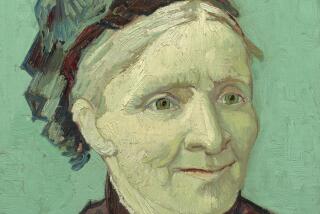For Seniors / Westside : LINDA FELDMAN : For This Doctor, Sculpting Became Salve for His Pain
Sy Rosenwasser’s beloved black bag used to contain all the tools of his trade--catheter, stethoscope, blood pressure machine. Now it sits on a table in his studio with the tools of his new passion--patina chemicals, gloves and cloths to polish the bronze statues he has created.
The 69-year-old urologist-turned-sculptor still remembers the exhilaration he felt when he decided to become a doctor--and the salve that art provided for his pain.
With all seriousness he looks you in the eyes and praises the catheter--a medical device inserted to clear passageways. “Such a fabulous tool,” he said. “It can take someone from absolute pain to relief. It made me become a urologist and it appealed to my ability to solve problems.”
That ability sprouted in his boyhood in New York, when he tackled such challenges as earning pocket change.
He remembers selling shopping bags outside his parents’ fish market and hiring a team of other boys to sell soda pop on street corners.
Growing up as a first-generation American, his mother influenced him by saying that as a Jew in an intolerant society one must make a special effort to contribute. And medicine was one of those ways, playing to his desire to heal people and his strength as a problem solver.
“Surgery is a solution for me. A surgeon looks at something, figures out what needs to be cut out and returns the patient to normal,” he said.
For Rosenwasser there has always been a solution to any problem. So imagine this man, who chose a profession that so fit his personality, watching the woman he loved endure 37 years of illness.
She got sick shortly after they were married. He was juggling three practices, looking after his wife, and eventually their two children, and trying to maintain his well-being when a cardiologist friend invited him to someone’s home where a sculptor was giving lessons.
It was love at first touch.
“I never had any time or interest in art but when I was handed this sack of clay I didn’t want to leave. It was like the other side of me which wanted to build and create had finally found a way to do that,” he recalled.
“What happened to me was that I created a balance--I found something to engross me and at the same time it gave me a free mind to deal with all of my problems,” he said.
Rosenwasser built a studio and worked in it in the evenings keeping a phone nearby in case a patient called. He started to develop a critical eye and like everything in his life, he would never be happy with something if it was half good. So from the very beginning it was never a hobby or an escape--it was going to be meaningful.
He went from figurative representations to abstract and eventually created the fountains for the sculpture garden at his Brentwood home.
His work, with titles like “Amore” and “La Familia,” are sensual masses of bronze laced with his feelings about relationships. With the death of his wife five years ago and his retirement from his medical practice, Rosenwasser felt a release.
“I loved my wife and I wanted to take care of her. I loved medicine, too. But, I feel relieved,” he said.
Rosenwasser is a man from a generation that took care of the people they loved and nourished the talents they developed themselves. It was an essential part of being a man. He was from an era where being a doctor had a simple yet compelling mission--to take care of your patient and help them to get well, disregarding cost.
“As a doctor I was an advocate for my patients and now, unfortunately, many doctors have become gatekeepers trying to keep patients out of the system in order to maintain their income, which essentially is dictated by the government and insurance companies. I was for private care in an insurance company-driven environment and I knew I had to leave medicine,” he said.
Now, he’s in his studio every day.
His work sells from $2,500 to over $100,000 and he has been commissioned by Rolex Corp., Hyatt Hotels Corp. and Harcourt, Brace Jovanovich Inc. He has shown pieces in galleries here and abroad. On Sept. 30, his wife’s birthday, he will donate, in her memory, “La Familia” to the UCLA Medical Center as part of Women’s Health Month.


